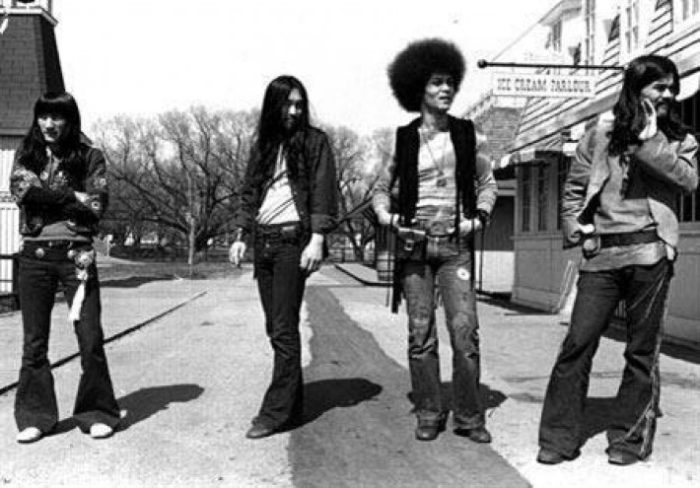Almost unknown in Japanese musical circles today, Joey “Pepe” Smith played a brief but important role in the cultural ferment of the early seventies.
My friends Keiichi Miki and Christine Cunanan recently caught up with the man in the Philippines and you can read the highly entertaining interview that resulted here.
Back in 1971/2, Joey’s claim to fame was as the singer, drummer and main songwriter for Japanese heavy rock trio Speed Glue and Shinki.
Speed Glue and Shinki enjoyed a fleeting minor success then broke up, only to become a cult item decades later, mainly due to the efforts of proselytizers such as Julian Cope, who ranks their second and final album number two in his list of 50 “Japrock” classics.
The band members are described on Cope’s Head Heritage website as three rock ‘n roll kings of oblivion disguised as Pacific Rim gypsy mongrels …
As the above implies, all three were outsiders who managed to fulfill a particular need at a particular time. Shinki Chen, the guitarist, was half Chinese. Bassist Masayoshi Kabe, the “glue” man, was half French. Both men had already made some impact on the Japanese music scene before the trio was formed – Shinki with supergroup Food Brain and Kabe with The Golden Cups, part of the “Group Sounds” phenomenon that emerged in the wake of Japanese Beatlemania.
Joey Smith was a real life “Pacific Rim gypsy.” Half American and half Filipino, he was already something of a veteran by the time he showed up in Shinjuku, the epicentre of the Japanese counterculture. He had played for American GIs in Saigon in 1965 and opened for the Beatles in Manila a year later, indeed was involved in a bizarre stand-off between the Fab Four and Imelda Marcos.
At the time it was still the case that the lyrics for Western-style Japanese rock and pop songs had to be in English if credibility was to be assured. Only with the success of Happy End would Japanese language lyrics became acceptable and then, rapidly, indispensable. It is doubtful that Joey’s druggie lyrics would have got by the Japanese authorities if sung in the vernacular.
After Speed Glue and Shinki folded, he returned to the Philippines via London. Now known as “Pepe” Smith, he joined the legendary Juan Dela Cruz Band in 1973 and wrote Himig Natin, (“Our Hymn”), the Filipino equivalent of “No Woman No Cry.”
Shinki Chen, once tipped as Japan’s answer to Jimi Hendrix, decided to move away from the limelight. After the demise of SSK, he never recorded again, focusing on live performance instead. He is still around but does not have a Wikipedia page or much internet presence.
In contrast, bassist “Louis Louis” Kabe went on to much greater success with rock band Pink Cloud and remains active today.
With the exception of the Afro, which is long gone, Joey Pepe Smith does not seem to have changed at all. As you can see from the interview, he is a great raconteur with a boatload of fascinating tales to tell, some of which may even be true.

